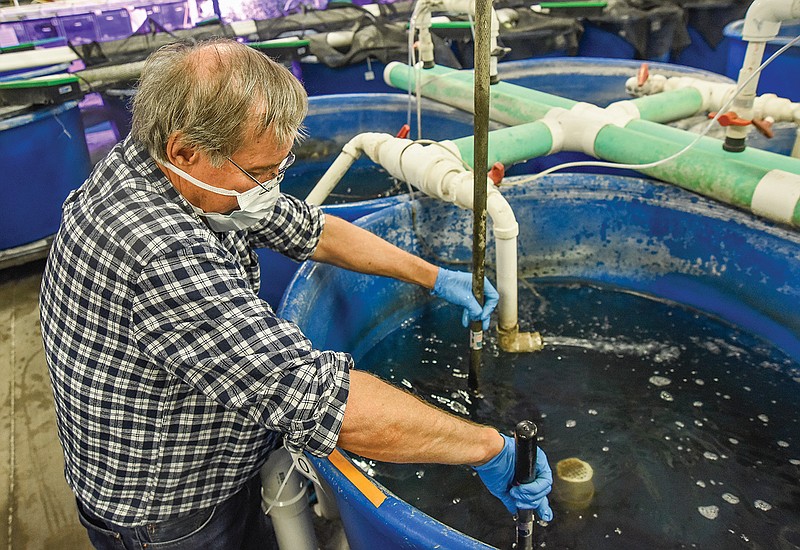A Lincoln University professor is trying to maximize the value of farm-raised bass, and Monday was the beginning of harvest - even despite the COVID-19 pandemic.
Things have changed at the George Washington Carver Research Farm, where LU has its aquaculture research facility and where Jim Wetzel is LU's aquaculture program coordinator.
Wetzel and the three other workers at the site Monday were all wearing face masks, even outside on a sunny, warm day as Wetzel showed the outdoor ponds holding several varieties of fish.
There also weren't any students on site Monday. Wetzel said six or seven students have been involved with the project to study whether large mouth bass or spotted ("Kentucky") bass are more economical, but that's now down to three students, with almost all of LU's students having left campus for the rest of the semester to study remotely.
The real difference Wetzel and the team are studying, though, is not between the fish outside in ponds or inside in tanks, but how much more of each fish is edible between the two kinds of bass - how much more meat is on the bones, based on the fishes' weight and length.
Wetzel's research with fish aims to benefit small-time farmers, so the fishes' livers were also being examined.
Swollen livers indicate too many carbohydrates in the fishes' diets, and that indicates it costs more to raise those fish.
It's the third year of the U.S. Department of Agriculture National Institute of Food and Agriculture-funded project, Wetzel said.
He said previous years' work has shown the largemouth bass take longer than the spotted bass to feed train - teaching them to eat man-produced food pellets instead of their natural food. If fish eat the pellets, the facility can produce a lot more pounds of fish in a small area.
The trade-off is that the largemouth bass grow faster, and researchers are trying to develop hybrids that capture the best of both types of fish, Wetzel said.
There were 1,000 fish inside the lab for the trial, to be harvested and examined over the coming days, with more fish out in the ponds.
With supply chains disrupted and not enough fish for a large order, Wetzel said, the goal is to locally market the fish.
The plan is also to restock the outdoor ponds currently containing other fish with bass, once the other fish are harvested.
Wetzel said he's worked with a variety of students: agriculture, animal science, business, biology, even history. "They get genuine, hands-on experience," he said.

